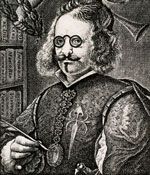Author´s books
-
 Unpublished Poems: Attributions in the Évora manuscript
Unpublished Poems: Attributions in the Évora manuscript

Francisco de Quevedo (madrid, 1580 - Villanueva de los Infantes, 1645), with his vast culture and noble lineage, is one of the most ingenious writers of the Spanish Golden Age. He was an ambassador in the Italy of Humanism, Gentleman of the Torre de Juan Abad and Gentleman of the Order de Santiago. Notably influenced by Greco-Latin literature and Stoic philosophy, he cultivated Lucianesque satire, wrote political treatises for the kings' regime, theological-moral works, poetry and drama. He chose the study of the pagan classics – who he defended and translated – and scorned the hypocrasy of erudition.
The power of his pen was worthy of a Cervantian Parnaso but, as with all complex talents, this also lead him to imprisonment, exile and death. "A broken composer of couplets", he did not live to see his complete works of poetry, Nueve Musas, in print.
